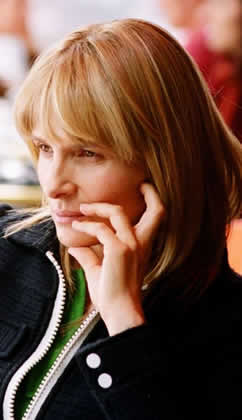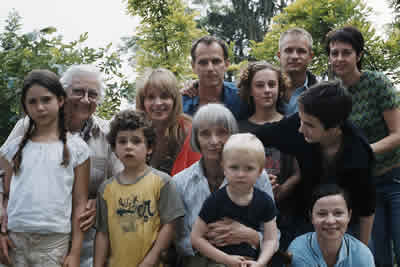The film begins in the Parisian suburbs at the home of Helene (Edith Scob), a widowed woman who is celebrating her 75th birthday along with her three grown children and 5 grandchildren. The youngest child is Adrienne (Juliette Binoche), an opinionated and free spirited artist who currently resides in New York city and rarely returns home to France. The middle child is Jeremie (Jeremie Renier); he appears to be the most logical of the children and is happily married with three young children. Jeremie works for a sneaker company which has its operations based in china and because of this he, like Adrienne, rarely returns home to visit his mother. The oldest of the children is Frederic (Charles Berling); he is also married but with two teenage children. Frederic is very close to his mother, unlike the other two siblings who seem to have mixed feelings about their mother, particularly when it pertains to her romantic relationships and her apparent lack of interest in their personal lives. Of all the children Frederic is the only one who has consistently remained in France. 
During the party Helene pulls Frederic into the house and shows him the numerous art pieces that she has collected over the years. She stresses to him the importance of the pieces but at the same time suggest that after she is gone that he sell the pieces. Frederic is angered by this, believing that his mother wishes him to sell away her existence and the memories that he and his siblings experienced in the house as children. Frederic promises to preserve the pieces and the house itself, despite the fact that is it not financially logical. Eventually Helene passes away, and leaves the house to her three children. Adrienne and Jeremie agree that because of the status of their relationships and careers, they have no real need for the house and decide that it would be in the best interest to sell the house along with the art collection. Frederic Hesitantly agrees and thus begins an emotional journey in which the three begin to parcel way their past, while at the same time trying to gain a perspective of their future.
One of the most unique factors of the film is the fact that there is little or no aggressive conflict between the characters. Traditionally when filmmakers are dealing with issues such as death and loss, it is an opportunity for them to show people at their most vulnerable and tense; particularly when you are dealing with siblings who have conflicting character views on the deceased. In Summer Hours we have three adults, who seem to take the death of their mother rather well, and the few moments of remorse that they have seem to be more rooted the fact that they were not able to settle whatever issues they had with their mother before her passing, as opposed to them being truly heartbroken over her death. Frederic is the oldest in the family; so when his mother passes he feels that it is his responsibility to become the new patriarch and preserve the family’s traditions and values. This causes a rift between him and his siblings, as they appear to have been planning, even before the death of their mother, to sell and profit off of the house. We see some moments of tension between the characters but it never boils over, and eventually Frederic realizes that his feeling of responsibility is driven more by guilt, rather than a necessity to preserve his mother’s memory. As stated before this is a drama about three adults, therefore the director has them handle their situations as adults; foregoing the childish animosity and bickering and ultimately making them succumb to logic. By letting go of the past and focusing on their respective lives, the children have begun to truly live without the presence of their mother. Assayas’s experiment in non-conflict works well for me, especially in terms of realism and charm, but the lack of conflict can cause the film to be seen as slow and predictable for others.
 As with nearly all of Assayas’s films, the characters remain the focal point of the story. Assayas never allows excessive camera movement or brash visuals to interfere with the relationships that are being established on screen. The chemistry between the actors was excellent, they conversed and teased one another in a way that any siblings would. Their back and forth quips provided for great moments of humor in the film and I frequently found myself laughing along with the characters in these scene and sympathizing with them during their most emotional moments. By the second act of the film Charles Berling becomes the focal point of the story, as he is the only child to remain in Paris. His screen performance was excellent, seeing as how of the three children, Frederic had the biggest character arch and in order to perform the character effectively, an actor would require a substantial amount of emotional depth.
As with nearly all of Assayas’s films, the characters remain the focal point of the story. Assayas never allows excessive camera movement or brash visuals to interfere with the relationships that are being established on screen. The chemistry between the actors was excellent, they conversed and teased one another in a way that any siblings would. Their back and forth quips provided for great moments of humor in the film and I frequently found myself laughing along with the characters in these scene and sympathizing with them during their most emotional moments. By the second act of the film Charles Berling becomes the focal point of the story, as he is the only child to remain in Paris. His screen performance was excellent, seeing as how of the three children, Frederic had the biggest character arch and in order to perform the character effectively, an actor would require a substantial amount of emotional depth.
Summer Hours is one of the best films that I have seen this year, and is an excellent film for anyone looking for a warm yet deep look on family, tradition, and the importance of moving forward in spite of loss.
****1/2
Weak: 1 Star Average: 2 Stars Good: 3 Stars Very Good: 4 Stars Excellent: 5 Stars

